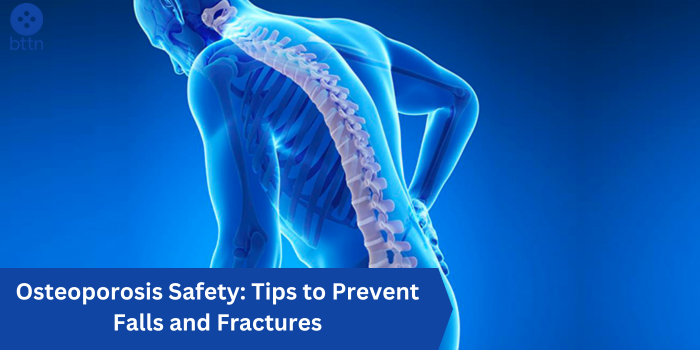
Osteoporosis Safety: Tips to Prevent Falls and Fractures
Posted by Pankaj Dhiman on Nov 6th 2023
Preventing Falls and Fractures: Your Guide to Osteoporosis Safety
Osteoporosis is a condition that affects the bones, making them fragile and more prone to fractures. It often develops silently, without any noticeable symptoms, until a fall or minor trauma leads to a fracture. This bone-weakening disease can be debilitating, but the good news is that many falls and fractures associated with osteoporosis can be prevented with the right knowledge and lifestyle changes.
In this blog, we'll explore the causes of osteoporosis, the impact of lifestyle on bone health, and provide you with valuable tips to prevent falls and fractures.
Must Read - 10 Best Elastic Bandages of 2023 (Wholesale Prices)
Causes of Osteoporosis
Understanding the causes of osteoporosis is the first step in protecting your bone health. Some of the primary factors contributing to this condition include:
- Aging: As we age, our bones naturally become less dense and more susceptible to fractures.
- Hormonal Changes: A drop in estrogen levels in women during menopause and a decrease in testosterone in men can lead to bone loss.
- Genetics: Family history can play a significant role. If your parents or grandparents had osteoporosis, you might be at a higher risk.
- Nutrition: A diet lacking in calcium and vitamin D can weaken your bones over time.
- Sedentary Lifestyle: Lack of physical activity can lead to weaker bones. Weight-bearing exercises are particularly important for bone health.
- Smoking and Alcohol: Excessive alcohol consumption and smoking can negatively impact bone health.
Must Read - 11 Best Nitrile Gloves to Buy in 2023 (Top Picks)
The Impact of Lifestyle on Bone Health
Your lifestyle choices have a profound impact on your bone health. Here's how you can take control of these factors to reduce your risk of osteoporosis:
1. Nutrition
A balanced diet rich in calcium and vitamin D is essential for strong bones. Dairy products, leafy greens, and fortified foods are excellent sources of calcium. Exposure to sunlight is vital for the body to produce vitamin D, but supplements are an option if you have difficulty getting enough sun exposure.
2. Physical Activity
Regular exercise is a key component of maintaining strong bones. Weight-bearing exercises, such as walking, jogging, and resistance training, help improve bone density and strength.
3. Smoking and Alcohol
Quit smoking and limit alcohol consumption. Smoking impairs your body's ability to absorb calcium, while excessive alcohol consumption can lead to bone loss.
4. Medications
If you're at a higher risk of osteoporosis due to factors like aging or family history, your doctor might recommend medications to help strengthen your bones.
5. Fall Prevention
Take steps to minimize your risk of falling, as this is a significant concern for those with osteoporosis. Keep your living space well-lit, use handrails, and remove tripping hazards.
6. Regular Check-ups
Consult your healthcare provider for bone density tests, which can help identify any early signs of osteoporosis. Early detection is crucial for effective management.
Must Read - Urinary Catheters: Types, Uses, Care, and Risks
Tips to Prevent Falls and Fractures
Preventing falls and fractures is a crucial aspect of managing osteoporosis. Here are some practical tips to enhance your safety:
- Balance and Strength Training: Consider balance and strength exercises to improve stability and reduce the risk of falling. Tai Chi and yoga can be particularly beneficial.
- Footwear: Choose footwear with non-slip soles and proper arch support. Avoid high heels or shoes with an unstable sole.
- Home Safety: Make your home safer by securing loose rugs, using non-slip mats in the bathroom, and installing handrails in areas prone to slips.
- Medication Management: Be aware of any side effects of medications you're taking. Some drugs can cause dizziness or unsteadiness, so consult your doctor if you experience these symptoms.
- Regular Eye Exams: Maintain good vision by scheduling regular eye exams. Poor vision can significantly increase your risk of falls.
- Bone Health Supplements: If needed, talk to your healthcare provider about calcium and vitamin D supplements to ensure you're getting the right nutrients for strong bones.
- Fall Awareness: Pay attention to your surroundings and take your time when walking. Slowing down can help prevent accidents.
- Assistive Devices: If necessary, consider using assistive devices like canes or walkers to improve your stability.
Remember, osteoporosis is a manageable condition, and with the right lifestyle changes and precautions, you can significantly reduce your risk of falls and fractures.
Must Read - 10 Tips for Choosing the Right IV Supplies
Conclusion
Osteoporosis is a common but preventable condition that affects the quality of life for many individuals, especially as they age. By understanding the causes, implementing a bone-friendly lifestyle, and following our tips to prevent falls and fractures, you can take charge of your bone health.
If you suspect you may have osteoporosis or are at risk, consult with your healthcare provider. They can provide guidance on how to manage your condition effectively and improve your quality of life. Prioritizing your bone health today can lead to a safer and more active tomorrow.
